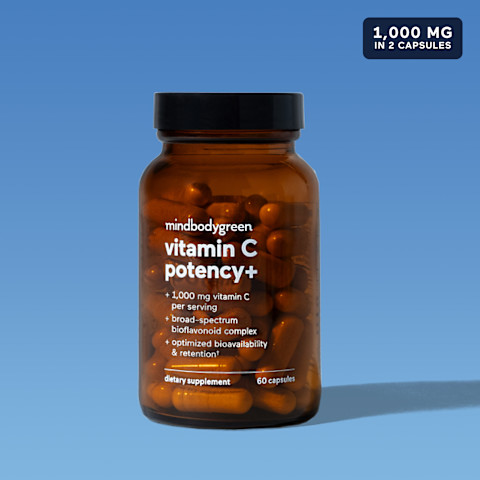Waiting Until You Feel Off To Take Vitamin C Isn't Effective — Here's Why

It's Friday morning: Co-workers have been calling out left and right, and you wake up feeling subpar. Maybe you should've gone to bed earlier last night or at least opted for a bowl of chicken noodle soup to nourish yourself. You head downstairs and reach for your vitamin C, hoping it'll enhance your well-being—after all, you're so close to the weekend!
We've all been there, reaching for the vitamin C when there's signs of trouble on the horizon. But waiting until the last minute to up your vitamin C intake may not be the most effective approach to supporting your immunity (because that's not exactly how nutrients and robust immune systems work).*
Should vitamin C be taken "as needed" or proactively?
While vitamin C is a powerful player in both innate and adaptive immune response and function1, taking it as needed certainly won't hurt, but it's not going to be the most effective approach for supporting your immune health.*
When it comes to immunity, vitamin C is a key player.* In fact, vitamin C gets utilized at such a high rate by our immune cells that vitamin C stores need to be replenished in order to keep your immune system healthy and resilient2.*
In other words, if you want to fully support your immune system, making sure you get enough vitamin C daily is vital.* And considering 46% of U.S. adults are failing3 to consume the recommended amount of vitamin C each day, there's a 50/50 chance you could benefit from a high-quality, daily vitamin C supplement.*
How does vitamin C support immunity?
Vitamin C is the body's leading water-soluble antioxidant, and its free-radical-scavenging abilities and anti-inflammatory actions are an important part of the body's immune response across organ systems.*
For starters, the essential vitamin helps protect the body's first line of defense—the skin.* Vitamin C helps strengthen the epithelial barrier4, aka the skin's physical barrier that helps protect the body from the outside environment.* As a scavenger of reactive oxidative species (ROS), vitamin C maintains oxidative balance5 in the skin and throughout the rest of the body.*
When it comes to innate immunity (i.e., the natural defense mechanisms you are born with), vitamin C helps regulate several aspects of white blood cell function2.* It is involved in the production, regulation, and function of different types of leukocytes, such as neutrophils—white blood cells that patrol the body to keep it safe; in other words, you can't even create the immune cells (to fight for you) without vitamin C.*
All in all, vitamin C is an undeniably important micronutrient that directly supports the immune system from multiple angles, helping to bolster the body's natural defenses and combat oxidative stress.*
The takeaway
Your immune system isn't going to benefit if you add vitamin C to your routine as a last resort. When it comes to supporting your immune health, think of vitamin C as your starting quarterback—not the Hail Mary pass you make when the clock is running out.*
If you're struggling to get enough C from your foods alone, consider supplementing with a vitamin C supplement to bridge the nutrient gap and ensure you're reaching sufficient levels of the essential vitamin.*
A high-quality, bioavailable vitamin C supplement—like mindbodygreen's vitamin C potency+—can help support not only your immune system but also your skin health, cardiovascular function, and nervous system.* When it comes to whole-body health, vitamin C truly is an all-star athlete.

